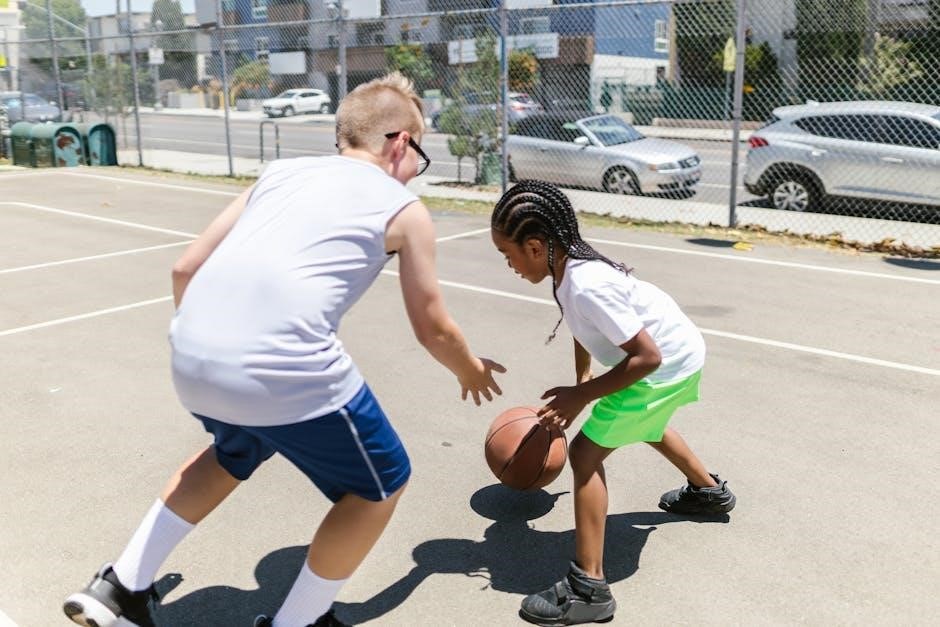
social skills workbook pdf
A social skills workbook is a self-guided tool designed to enhance social competence through structured activities and exercises. It offers practical strategies for improving communication, confidence, and interpersonal interactions, making it a valuable resource for personal development.
1.1 What is a Social Skills Workbook?

A social skills workbook is a self-guided learning resource designed to help individuals improve their social competence. It typically includes exercises, quizzes, and real-life scenarios to practice essential skills like communication, empathy, and conflict resolution. These workbooks are often used by parents, educators, and therapists to support personal development, particularly for children with special needs or those struggling with social interactions. Available in formats like PDF, they offer a structured approach to learning, making them accessible and convenient for digital use. By focusing on practical activities, social skills workbooks provide a hands-on way to build confidence and foster positive relationships. They are adaptable to various age groups and developmental levels, ensuring tailored growth for each user.
1.2 Importance of Social Skills Development
Social skills development is crucial for building strong relationships, effective communication, and emotional well-being. It enables individuals to navigate various social situations confidently, fostering empathy and understanding of others’ perspectives. Strong social skills enhance collaboration, problem-solving, and conflict resolution, which are vital in both personal and professional settings. Developing these skills early in life can lead to better academic performance, stronger friendships, and a more positive self-image. For individuals with special needs or those facing social challenges, targeted skill development can be transformative, helping them overcome barriers and integrate more seamlessly into society. Investing time in social skills development promotes long-term success and a higher quality of life, making it an essential focus for personal growth and societal harmony.


Key Sections of a Social Skills Workbook
A social skills workbook is organized into sections like understanding social skills, practical exercises, and progress tracking, offering structured activities to enhance communication and interpersonal abilities effectively.
2.1 Understanding Social Skills
Understanding social skills is the foundation of any effective workbook. Social skills refer to the abilities that enable individuals to interact and communicate effectively with others. These skills include verbal and non-verbal communication, active listening, empathy, and conflict resolution. Workbooks often begin by explaining the importance of these skills in daily interactions, whether in personal relationships, professional settings, or educational environments. They emphasize how social skills impact how others perceive and respond to us. By breaking down complex social interactions into manageable concepts, workbooks help users identify their strengths and areas for improvement. This section typically includes exercises and real-life scenarios to illustrate key social skills, making them relatable and easier to understand. The goal is to provide a clear framework for developing these essential life skills.
2.2 Practical Exercises for Social Skills Development
Practical exercises are a cornerstone of social skills workbooks, offering hands-on activities to apply and refine social competencies. These exercises often include role-playing scenarios, conversation starters, and reflection prompts to help users practice real-life interactions. Many workbooks incorporate worksheets, quizzes, and self-assessment tools to track progress and identify areas for improvement. For example, exercises might focus on active listening, initiating conversations, or resolving conflicts. Some workbooks also provide visual aids and step-by-step guides to simplify complex social situations. By engaging in these exercises, individuals can build confidence and develop habits that enhance their interpersonal relationships. The goal is to create a safe space for practice, allowing users to experiment with new skills before applying them in real-world settings. These exercises are designed to be adaptable, catering to different learning styles and needs.

Benefits of Using a Social Skills Workbook
Social skills workbooks provide structured activities to improve communication, increase confidence, and enhance interpersonal interactions through practical exercises and self-assessment tools.
3.1 Improving Communication Skills
Social skills workbooks offer practical exercises to enhance communication, such as active listening, expressing emotions, and initiating conversations. They provide structured activities like role-playing scenarios and reflection prompts to help individuals articulate their thoughts clearly. These tools often include worksheets for practicing verbal and non-verbal cues, such as maintaining eye contact and using appropriate body language. By focusing on real-life situations, workbooks empower users to build confidence in their ability to engage effectively with others. Many resources also include self-assessment exercises, allowing individuals to track their progress and identify areas for improvement. Improved communication skills foster stronger relationships and greater social confidence, making these workbooks invaluable for personal and professional growth. Their accessible format ensures that learning is both engaging and effective, catering to a wide range of needs and skill levels.

3.2 Enhancing Self-Confidence
Social skills workbooks play a crucial role in boosting self-confidence by providing practical strategies to overcome self-doubt and insecurities. Through guided exercises, individuals can identify and challenge negative thought patterns, fostering a more positive self-image. Many workbooks include activities such as affirmations, goal-setting, and self-reflection, which empower users to recognize their strengths and achievements. By practicing social interactions in a safe and structured environment, individuals build resilience and confidence in their ability to connect with others. Enhanced self-confidence not only improves personal relationships but also contributes to greater success in professional and academic settings. These tools are particularly beneficial for those who struggle with shyness or social anxiety, offering a supportive framework for gradual and meaningful growth. Over time, consistent use of these workbooks can lead to lasting improvements in self-esteem and overall well-being.
How to Effectively Use a Social Skills Workbook

Effectively using a social skills workbook involves setting clear goals, practicing exercises regularly, and tracking progress. These tools, designed for parents, educators, and therapists, offer structured activities to enhance social competence.
4.1 Setting Goals for Social Skills Development
Setting clear and achievable goals is essential when using a social skills workbook. These goals should be specific, measurable, and relevant to the individual’s needs, ensuring progress can be tracked effectively. For example, goals might focus on improving communication, enhancing self-confidence, or mastering specific social behaviors. By breaking down larger objectives into smaller, manageable tasks, individuals can gradually build their skills. Workbooks often provide structured exercises and assessments to help users identify areas for improvement and set realistic targets. Regular review and adjustment of these goals ensure continuous growth and motivation. This systematic approach helps users stay focused and committed to their social skills development journey.
4.2 Tracking Progress and Self-Assessment
Tracking progress and self-assessment are crucial components of effectively using a social skills workbook. Many workbooks include exercises and assessments designed to help individuals monitor their development over time. By regularly reviewing completed activities, users can identify areas of improvement and celebrate successes. Self-assessment tools, such as reflection prompts or progress tracking sheets, enable individuals to evaluate their growth objectively. This process fosters accountability and motivation, as users can see tangible advancements in their social skills. Additionally, some workbooks provide benchmarks or checklists to measure progress, helping users stay on track with their goals; Regular self-assessment ensures that skills are being applied consistently and effectively in real-life situations, enhancing overall social competence and confidence. This iterative process is key to achieving long-term success in social skills development.
Popular Social Skills Workbooks Available in PDF
Popular social skills workbooks like “Social Skills Printables Workbook” by S. B. Linton and “Six Minute Social Skills Workbook” by Janine Toole are widely available in PDF format, offering practical exercises for personal development.
5.1 “Social Skills Printables Workbook” by S. B. Linton
This workbook, authored by S. B. Linton, is a comprehensive resource designed to help individuals improve their social skills through practical exercises and activities. Published in 2019, it spans 100 pages and is available in PDF, EPUB, and Kindle formats, making it easily accessible for digital use. The workbook is particularly beneficial for parents, grandparents, caregivers, teachers, and therapists working with children, especially those with Autism. It focuses on essential social skills such as sharing, taking turns, and resolving conflicts, providing a structured approach to learning and development. The content is organized into clear sections, offering a user-friendly experience. With its emphasis on practical application, this workbook is an invaluable tool for fostering social competence and confidence in both children and adults.

5.2 “Six Minute Social Skills Workbook” by Janine Toole

Written by Janine Toole, the “Six Minute Social Skills Workbook” offers a concise and efficient approach to improving social skills. Published in 2017, this workbook is designed to be completed in short, manageable sessions, making it ideal for individuals with busy schedules. It is available in multiple formats, including PDF, EPUB, and Kindle, ensuring accessibility for a wide range of users. The workbook focuses on practical exercises and strategies to enhance communication, self-confidence, and interpersonal interactions. Its structured format allows users to track their progress and identify areas for improvement. Whether for personal growth or professional development, this workbook provides a straightforward and effective way to develop essential social skills in just six minutes a day.

Social skills workbooks are invaluable tools for enhancing communication, confidence, and relationships. They offer practical exercises and strategies to help individuals develop essential interpersonal skills effectively.
6.1 Final Thoughts on the Value of Social Skills Workbooks
Social skills workbooks provide a comprehensive approach to improving interpersonal skills, offering practical exercises and strategies. They cater to diverse needs, from children with autism to professionals seeking self-improvement. These resources empower individuals to build confidence, enhance communication, and foster meaningful relationships. With structured activities and self-assessment tools, workbooks enable users to track progress and identify areas for growth. Their versatility allows for use in various settings, including homes, classrooms, and therapeutic environments. By focusing on essential life skills, these workbooks contribute to personal and professional development, making them an invaluable tool for anyone aiming to improve their social competence and overall well-being;
Leave a Reply
You must be logged in to post a comment.